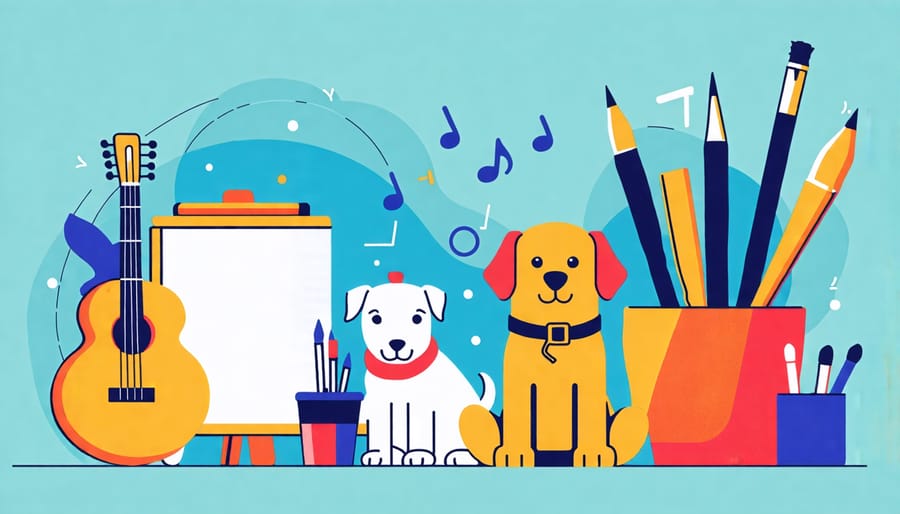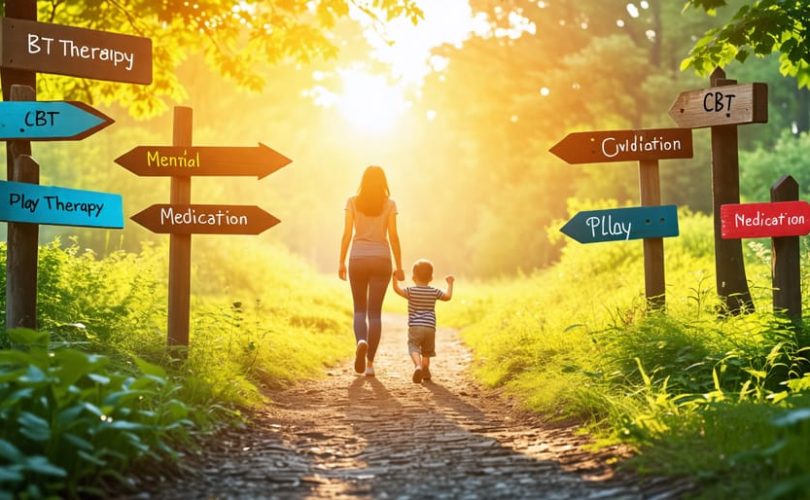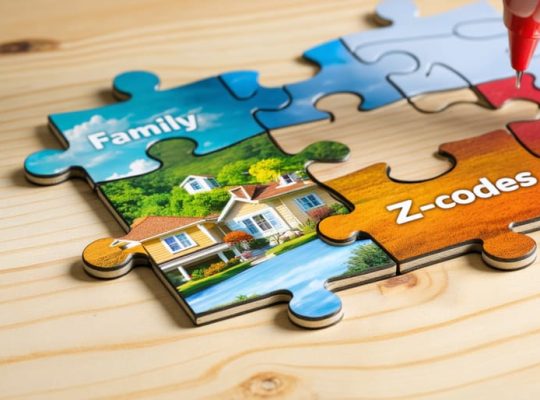Recognize potential mental health concerns early. Watch for warning signs like changes in mood, sleep, appetite, or behavior. Trust your parental instincts if something seems off.
Consult with your child’s pediatrician or a mental health professional. They can assess your child, provide an accurate diagnosis, and recommend appropriate treatment options.
Explore evidence-based therapies like cognitive-behavioral therapy (CBT), family therapy, or play therapy. These approaches, often used in child therapy, help children develop coping skills, improve communication, and work through emotional challenges.
Consider medication if recommended by a psychiatrist. While not always necessary, medications can be highly effective for certain mental health conditions, especially when combined with therapy.
Therapy and Counseling

Cognitive-Behavioral Therapy (CBT)
Cognitive-Behavioral Therapy (CBT) is a highly effective, evidence-based treatment for children struggling with mental health issues. CBT focuses on helping children identify and change negative thought patterns and behaviors that contribute to their emotional distress. Through interactive sessions with a trained therapist, children learn practical coping skills and problem-solving strategies to manage their symptoms. CBT is tailored to each child’s unique needs, taking into account their age, developmental stage, and specific challenges. Research has consistently shown that CBT can significantly reduce symptoms of anxiety, depression, and other mental health conditions in children. By equipping children with the tools to navigate their emotions and challenges, CBT empowers them to build resilience and thrive. With its proven track record and emphasis on skill-building, CBT is a valuable treatment option for parents seeking to support their child’s mental well-being.
Play Therapy
Play therapy is a powerful mental health treatment option for young children struggling with emotional, behavioral, or developmental issues. Through the use of toys, games, and creative activities, trained therapists help children express their feelings, process traumatic experiences, and develop coping skills in a safe, nurturing environment. By engaging in play, children can communicate their inner world more effectively than through words alone, allowing therapists to gain valuable insights and guide them towards healing. Play therapy has been shown to improve self-esteem, enhance social skills, and reduce anxiety, depression, and aggression in children. It is particularly beneficial for those who have experienced abuse, neglect, or other adverse childhood events. With the support of a skilled play therapist, children can learn to regulate their emotions, build resilience, and develop a more positive outlook on life. If you believe your child could benefit from play therapy, consult with a mental health professional to explore this effective treatment option.
Family Therapy
Family therapy is a crucial component of mental health treatment, recognizing that a child’s struggles impact the entire family unit. By involving parents, siblings, and sometimes extended family members in the therapeutic process, family therapy aims to improve communication, resolve conflicts, and foster a supportive home environment. This approach helps families understand and adapt to the challenges of having a child with mental health issues, while also addressing any underlying family dynamics that may be contributing to the child’s difficulties. Through family therapy, parents learn strategies to better support their child’s treatment and siblings gain tools to cope with their own emotions and experiences. Ultimately, involving the whole family in treatment leads to more sustainable, long-term improvements in a child’s mental health and overall family well-being.
Medication Options
Types of Medications
Several primary categories of psychiatric medications may be prescribed to children struggling with mental health issues, depending on their specific diagnosis and symptoms. Stimulant medications like Ritalin or Adderall are often used to treat attention deficit hyperactivity disorder (ADHD), helping to improve focus and reduce impulsivity. Antidepressants, such as selective serotonin reuptake inhibitors (SSRIs) like Prozac or Zoloft, can be effective in managing depression and anxiety disorders by regulating mood and emotional balance. For children with bipolar disorder, mood stabilizers like lithium or Depakote may be recommended to help stabilize mood swings and prevent manic or depressive episodes. In some cases, antipsychotic medications like Risperdal or Abilify might be prescribed to manage symptoms of psychosis, severe aggression, or self-injurious behaviors. It’s crucial for parents to work closely with a child psychiatrist to determine the most appropriate Types of Medications and dosages, while also monitoring potential side effects and adjusting treatment plans as needed. A comprehensive approach that combines medication with therapy and lifestyle changes often yields the best outcomes for children’s mental health.
Potential Side Effects and Risks
While medication can be an effective treatment for many mental health conditions, it’s important to be aware of potential side effects. These may include weight gain, nausea, fatigue, dry mouth, or sleep problems. In rare cases, some antidepressants may increase suicidal thoughts in young people. It’s crucial to work closely with a doctor to monitor any side effects. Medication isn’t right for everyone, and finding the proper treatment may involve trial and error. Be patient with the process and maintain open communication with your child’s healthcare team. Together, you can weigh the risks and benefits to determine the best approach for your child’s unique needs.

Alternative and Complementary Approaches
Mindfulness and Meditation
Mindfulness and meditation can be powerful tools for promoting children’s mental well-being. These practices help kids develop awareness of their thoughts, feelings, and bodily sensations, fostering a sense of calm and inner peace. Through mindfulness, children learn to observe their emotions without judgment, reducing stress and anxiety. Simple meditation exercises, such as focusing on the breath or visualizing a peaceful scene, can improve concentration, emotional regulation, and self-esteem. Incorporating mindfulness into daily routines, like bedtime or before school, can create a foundation of resilience and coping skills that will benefit children throughout their lives. By teaching mindfulness early on, parents and educators can equip kids with valuable tools for navigating life’s challenges and maintaining mental health.
Art and Music Therapy
Art and music therapy offer creative outlets for expressing emotions, processing experiences, and developing coping skills. Through drawing, painting, sculpting, or making music, children can communicate feelings they may struggle to put into words. These therapies provide a safe, non-judgmental space for self-expression and exploration. Engaging in creative activities can reduce stress, improve mood, and boost self-esteem. Art and music therapists are trained to guide children through the creative process, helping them gain insights and develop emotional regulation skills. While not a substitute for traditional talk therapy, these complementary approaches can be powerful tools in supporting mental well-being and fostering resilience in children.
Animal-Assisted Therapy
Animal-assisted therapy offers a unique approach to mental health treatment by harnessing the power of the human-animal bond. Interacting with animals, such as dogs, cats, or horses, can provide a calming and comforting presence for those struggling with mental health issues. This therapy has been shown to reduce stress, anxiety, and depression while promoting feelings of happiness, companionship, and unconditional love. Animals can also help foster a sense of responsibility, empathy, and self-esteem in children and adults alike. By incorporating animal-assisted therapy into a comprehensive treatment plan, individuals can experience the emotional benefits of connecting with animals while working towards improved mental health and well-being.
Working with Mental Health Professionals
Finding the right mental health professional is crucial for effective treatment. Start by asking for referrals from your child’s pediatrician, school counselor, or trusted friends and family. When meeting potential therapists, ask about their experience working with children, treatment approach, and availability. It’s essential to find a provider who is a good fit for your child’s needs and personality.
Collaborating with mental health professionals involves open communication, trust, and a willingness to follow through on recommended treatments. Share your child’s history, strengths, and challenges, and discuss your goals for therapy. Attend appointments regularly, and don’t hesitate to ask questions or voice concerns. Remember, you are an integral part of your child’s support system, and working closely with mental health experts can lead to the best outcomes.







